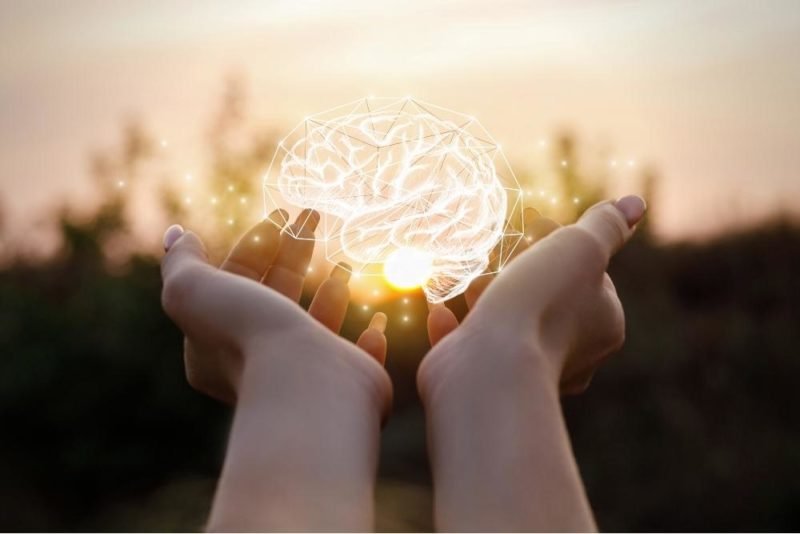[ad_1]

In our modern meals natural environment, most of us are blessed to have completely ready access to a wide range of food items. But what’s tough is that we are also exposed to a whole lot of visual foodstuff cues, such as:
- Commercials
- Open-principle kitchens
- Coworkers bringing in cookies or doughnuts
- Chips and sweet around the sign up even at merchants that do not generally market food items
This variety of surroundings makes it additional demanding to basically try to eat when we recognize we’re hungry. As a substitute, we might want to try to eat just since we lay eyes on a food stuff that seems to be tasty. More than time, visual food stuff cues could guide us to try to eat when we’re not hungry much more than we would if all those cues weren’t existing. (Note: this is considerably less likely to occur for persons who never experienced their interior intuitive eater knocked out of them, or who have reclaimed and practiced intuitive consuming expertise). We’re ingesting due to the fact we are searching for a reward, and that reward is not (or is not only) the satisfying of starvation.
Why does this occur? Let us investigate.

Evolution and your mind
Some behaviors that really do not make practical perception these days (and may even trigger us distress) created a ton of feeling to our extensive-back ancestors. If you were being an early hunter-gatherer, remembering how to access excellent resources of food stuff (which watering hole the wooly mammoths desire, where to obtain the berries that are not poisonous…and when they’re in season) would assistance make it possible for you to endure so you could just take part in perpetuating the species.
Remembering this critical foodstuff information and facts needs possibly beneficial or adverse reinforcement (or equally).
- With good reinforcement, you receive a reward for having a certain motion.
- With detrimental reinforcement, you minimize something destructive by taking a selected action.
The two styles of reinforcement enhance the odds that you will choose that motion once more in the potential, mainly because when our brains make the link concerning an motion (or behavior) and a reward, it results in a potent emotional memory.
Mentioned a further way, if you try to eat a delicious meals, and it tends to make you come to feel fantastic (beneficial reinforcement), you embed a memory that aids you later on remember in which you got the food, what you preferred about it, the circumstance in which we ate it, and so on.
Likewise, if you are stressed or unfortunate or nervous, and you try to eat one thing that helps you truly feel much less negative (damaging reinforcement), you might embed a memory that taking in specific meals lowers specified unpleasant thoughts.
I see the consequences of this “brain training” for foods rewards perform out in various strategies, most notably “food addiction” and dieting.

The “rewards” of dieting
Let us say you are counting energy, carbs or body fat grams—or in any other case “watching what you eat” or “controlling part sizes”—and you do shed pounds (as most people do for the brief phrase). If you get compliments about your shrinking overall body, that serves as constructive reinforcement to preserve accomplishing what you’re executing. That can assist compensate for the soul-sucking mother nature of taking in “good” foodstuff that you don’t truly like and offering up “bad” foods that you adore.
Chasing the benefits of compliments, praise and acceptance keeps men and women chasing weight loss, which perpetuates yo-yo dieting.
(There is another aspect to this coin, nonetheless. I have had clientele who ended up in a phase of their lifetime in which they had been more active than regular and taking in “normally,” and missing some body weight as a facet outcome. Then the compliments started out coming, which built them uncomfortable—not all people wishes their system to be commented on, even in a “positive” way—which triggered them to start out binge ingesting and/or becoming a lot less active so they could stay indoors and conceal their system. When they attained body weight and the physique complements stopped, this served as a damaging reinforcement to remain on this path.)
Let us not forget that restrained feeding on (meals restriction) typically qualified prospects to rebound having. This rebound ingesting may perhaps sense like emotional having, “out-of-control” taking in, or binging. In some situations, it may possibly essentially satisfy the clinical definition of a binge, and of binge feeding on ailment (Mattress).
The perpetuation of this rebound taking in in response to true or even perceived restriction (scarcity), is driven by food tasting so a lot far more rewarding following we’ve been deprived of it. On that note…

Fueling “food addiction”
On the “food addiction” entrance, I have had customers who experienced very powerful emotional feeding on tendencies. Often this started off in childhood (when they have been too youthful to have formulated other suggests of coping). In some cases this started off in adulthood (for the duration of very demanding, extremely fast paced situations of lifestyle when using time for significant self-treatment was a pipe desire).
Do you consider that making use of foods to feel cherished and cared for (good reinforcement) or to numb out (adverse reinforcement) makes effective emotional memories? Certainly it does.
It’s this reinforcement, and these psychological reminiscences, that hold neglected youngsters locked in an psychological consuming cycle a long time later on even if they now have a loving husband or wife, very good close friends and a satisfying lifetime. It is what tends to make a medical or mental health expert (who you could feel would “know better”) notice that they have no coping tools other than meals since foods constantly worked so nicely for them that they by no means bothered to diversify their coping toolbox.
There is some evidence that so-identified as “highly palatable” meals (processed meals superior in extra sugar, salt and unwanted fat) can have an even much more worthwhile influence. It can get to the level in which we so strongly anticipate that reward when we consume all those meals that it’s pretty tough to resist visual cues affiliated with people food items. For instance, a picture of someone taking in ice cream, a pizza advert on Television set, donuts (even stale donuts) in the crack area.
So is this food items dependancy, or is it brain schooling?

Retraining the brain
No matter of what you simply call it, ingesting that feels psychological or out of manage in some way might sense great in the moment, but then not so fantastic later.
- You could possibly sense guilt or shame (which you actually do not have earned)
- You may well have eaten to the level of bodily pain
- You could possibly anxiety excess weight get (even however your ingesting could not actually be leading to bodyweight attain and halting psychological/binge consuming could not direct to weight loss)
Which of these applications is very best for retraining your mind with regards to food items rewards?
- Willpower
- Mindfulness
- A lobotomy
Oh, I hope you explained B! Willpower is true, but it is not an infinite useful resource, and we use it up as we make choices and offer with stressors all over the working day. (When you want to say some thing snarky to a co-employee or honk at a rude driver, and you really don’t, you just utilized up some willpower.) And I’m not even heading to comment on the thought of a lobotomy.
Working with mindfulness in this context will involve:
- Becoming informed of our behaviors and what triggers them
- Checking out and recognizing the real rewards (bodily sensations and psychological effects) we get from the behavior—without judgement (!)
- Employing that information and facts to make a compassionate selection that supports self-treatment
When having a normal mindfulness meditation follow can assistance with this, a shorter, casual, in-the-second follow, these kinds of as this model of the RAIN meditation, may possibly be more helpful:
- Recognize the craving/taking in impulse
- Allow the expertise to exist, just as it is
- Investigate with interest and care what it feels like in the physique
- Note the related actual physical sensations from moment to moment, with self-compassion
If you would like to discover much more about RAIN, Tara Brach discusses it nicely on her web-site.

The bottom line
It’s easy to get caught in habitual behavior designs that we didn’t consciously pick out and could also be repeating endlessly without building a mindful option to do so. These patterns are not constrained to food…we may well find ourselves repeating certain styles in our relationships, our searching behaviors, and other aspects of life.
When we can glow a self-compassionate gentle on what we’re carrying out and why we’re executing it, it opens the doorway to producing a acutely aware choice, no matter whether that choice is in alignment with our proven habit, or a thing absolutely distinctive. The actuality that we now have a decision (no a lot more autopilot) is a get.
Carrie Dennett is a Pacific Northwest-based registered dietitian nutritionist, freelance writer, intuitive eating counselor, author, and speaker. Her superpowers consist of busting nutrition myths and empowering gals to feel much better in their bodies and make food stuff possibilities that assist satisfaction, nutrition and health.
 Print This Publish
Print This Publish
[ad_2]
Source connection





More Stories
PT and Chiropractic Are Not Covered Concurrently
Advantages of Chiropractic Care
Herbalife Promotes Healthy Nutrition Active Lifestyle Programme